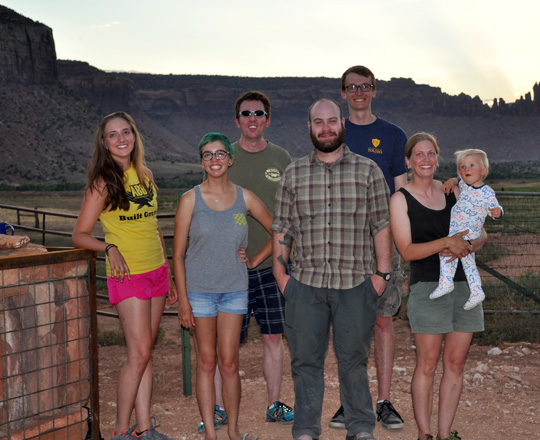When in Rome, lizards do as the Romans do.
A team of scientists and students at The University of Toledo found that desert short-horned lizards in southeastern Utah immediately adjust sun-basking behavior to offset warmer temperatures or minimize exposure to dangerous heat, according to climate change research published in the scientific journal Functional Ecology.

This short-horned lizard sported a data logger that continuously recorded light levels in different environments in the Abajo Mountains in Utah. UT researchers found the reptiles immediately adjusted sun-basking behavior to offset warmer temperatures or minimize exposure to dangerous heat.
“Individual lizards are able to adjust their sun-basking behavior to compensate for a different climate,” said Dr. Jeanine Refsnider, herpetologist and assistant professor in the UT Department of Environmental Sciences. “This is critical because it is a way that lizards can respond immediately to changes in environmental conditions.”
Refsnider said this flexibility is one way that lizards and other ectotherms might survive at least small amounts of climate change and avoid extinction.
“It’s a much faster response than evolutionary adaptation, which occurs over multiple generations,” Refsnider said.

The UT research team posed for a photo at Canyonlands Research Center near Monticello, Utah. They are, from left, Sarah Carter, Tyara Vazquez, Dr. Henry Streby, Ian Clifton, Adam Siefker and Dr. Jeanine Refsnider, who is holding Sora Streby.
Once the light-level recordings were done, the team recaptured the lizards, downloaded the data and returned them to their home sites.
“We found that transplanted lizards immediately adjusted their light-level use to match local lizards,” Refsnider said. “That means light-level use, one type of thermoregulatory behavior or way to regulate their temperature, is a highly flexible behavior. Our results provide hope that lizards may respond to climate change by adjusting the amount of time they spend in different light environments in order to compensate for warmer environmental temperatures.”
Refsnider said this UT study is unique compared to previous studies trying to predict effects of climate change on lizards because the team used lizards living in desert habitat, as opposed to tropical lizard species.
“Tropical lizard species normally experience fairly constant but very warm climates,” Refsnider said. “We focused on lizards living at high elevations in the desert that experience an extremely wide range of temperatures — from well below freezing in the winter that requires hibernation to pretty hot conditions in the summer similar to those experienced by tropical species.”
The UT authors of the published research include three professors, two graduate students and two undergraduate students. The faculty members are Refsnider; Dr. Henry Streby, ecologist and assistant professor in the UT Department of Environmental Sciences; and Dr. Song Qian, an environmental and ecological statistician and associate professor in the UT Department of Environmental Sciences. The graduate students are Ian Clifton and Tyara Vazquez. The undergraduate students are Adam Siefker and Sarah Carter.